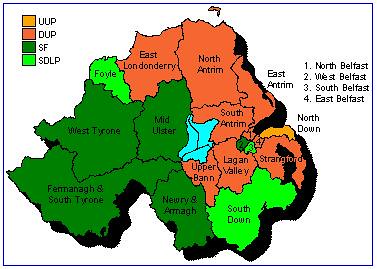Politics: Canada: Quebec shaken by Mario's ADQ gains
Quebec's electorate kicked out the provincial Liberal Party leader; he retained his pants but he lost his seat in the National Assembly (as Quebec's provincial parliament calls itself, eschewing the French-originated word "parliament" but hot instead for the semiotically- and emotionally-laden French term "national"). Not only did Lib leader Jean Charest get tossed in his own riding, his party floundered along with him. Quebec's Libs remain the party with the most votes and will form the new government (a minority govt, of course), having lost 24 seats out of 125 total, descending from 72 to only 48 seats. There are many holes in the pants of the prov Lib body politics in la belle province.
Where did these votes go? Largely, they flocked to the shepherd of a unique r+twing party, Action democratique de Quebec (ADQ), led by Mario Dumont who, in this his third campaign saw the party he founded rise from only 5 seats now to 41. That's a 36-seat gain. "Officially, Jean Charest is still premier. But starting today, the real boss is Mario Dumont," wrote columnist Vincent Marissal in the La Presse daily (via Reuters Canada), saying the ADQ's inexperienced team of legislators would have time to learn the ropes before the next election. Minority governments in Canada usually last about 18 months."
In this sudden and breath-taking rise, Mario (as he's called--only two other Quebec political leaders were referred to by their first names, Rene (Levesque) and Lucien (Bouchard), both of them separatists. Mario on the other hand, is no separatist, but neverthrless a strong "autonomist" both for Quebec firmly within Canada, and for the regions within Quebec, as in town-and-country areas citizens don't want to be ruled by the political elite that has held Quebec City, nor by the cultural elite that rules the flow of ideas in the French-language, from Montreal.
Reuters Canada reports on Dumont's achievement, short-changing it by calling it a mere "protest vote," but actually it is a basic reorientation of Quebec and particularly its francophone voters across the province.
Dumont and the ADQ tapped into growing public dissatisfaction with old-style politics, which for the last 30 years has seen power [merely] switch from the centrist Liberals to the left-leaning separatist Parti Quebecois (PQ), and back.The PQ, the separatist provincial party, also lost votes to Dumont. It's results were saw its number of seats drastically trimmed, dropping the PQ to "third place with only 36 seats (previously 46) and just 28 percent of the vote ... its worst showing since 1973." The PQ defeat was engineered by its leader Andre Boisclair. A homo, he tried to make this a political asset, flaunting rather than proving himself fastidiously circumspect in all other regards. Many homos took their votes elsewhere, humiliated by Boisclair's antics. Among those were the revelation that while a Minister of a previous PQ govt, Boisclair had indulged in cocaining. His ultra-avantgarde in the PQ imposed a glam boy on the hapless broader stretches of separatists loyalists; these people took just about as much as they could bear. Both the PQ's Boisclar and the Lib's Charest should resign.
"Faced with two parties, each as crippled as the other, he will be the master," wrote Michel David in the daily Le Devoir.
Dumont has promised to cut taxes, reduce the province's C$122 billion in debt and trim government bureaucracy.
Liberal legislators who had won their seats by several thousand votes in the 2003 election were brushed aside by the ADQ, which came very close to taking power.




